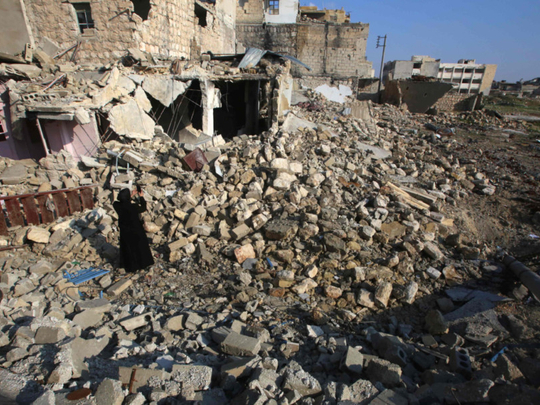
As the horror in Aleppo continues to unfold before the world every day, media analysts debated the situation in the Syrian city and pondered over its fate.
“Exhausted parents clutching terrified children in their arms, young people pushing the old in makeshift carts or wheelchairs and families pulling overstuffed suitcases: the scenes from east Aleppo are those of a new exodus,” said the Guardian in an editorial. “As Syrian government forces move on the last urban stronghold of the anti-[Al] Assad opposition... hundreds of men have been rounded up and disappeared. The onslaught has been going on for weeks. But now it is at a new intensity, as it approaches what may be the end game. A strategy of indiscriminate bombing, terror and destruction, the UN was told, threatens to turn this part of Syria’s second city into a giant graveyard. Syrian army leaflets dropped on the city warn the inhabitants that they must flee, or face annihilation,” said the newspaper.
Outraged that “rebel-held Aleppo seems condemned to utter destruction and defeat,” the paper said: “Posted on social media, citizens’ desperate messages resemble final pleas, all hope gone. US Department of State officials have made it clear that nothing much can be done; western countries have convened an emergency [United Nations] Security Council meeting, but beyond words of condemnation and warnings of a humanitarian catastrophe in the making, the powerlessness of UN institutions is obvious.”
The Washington Post meanwhile blasted US President Barack Obama for what it called his utter inaction on Syria. “The [Obama] administration’s response seemed clear: It will hotly condemn the assault on Aleppo, but do absolutely nothing to stop it. On the contrary, Secretary of State John F. Kerry insisted he will continue to go back to [Russian President] Vladimir Putin with diplomatic offers, hoping it will choose to stop bombing. ‘The United States makes absolutely no apology for going the extra mile to try and ease the suffering of the Syrian people,’ he grandly declared after a meeting Thursday on Syria. By ‘extra mile,’ he doesn’t mean actual US steps to protect civilians — just more futile and debasing appeals to Moscow.”
Observing that “the losers are the civilians trapped in eastern Aleppo — 250,000 to 275,000 human beings — who are cut off from supplies of food and medicine and being bombed mercilessly,” the paper said: “They are, indeed, victims of barbarism — but the rhetoric of US diplomats won’t help them much.”
The Irish Times was more subdued in its approach and said: “There is no consensus on how many of the 10,000 or so rebel fighters left in the east of the city are in groups linked to Al Qaida/[Daesh]. The UN says a few hundred, while rebels say it is lower, and the Syrian government and the Russians claim it is far higher. The resumption of fighting in Aleppo came just a day after President Putin had a first discussion with [US] President-elect Donald Trump. The Obama administration has rightly condemned what it says is indiscriminate bombing... But, even before Trump assumes office, there is a new voice that matters more.”
The News in Pakistan scrutinised what it called “the turning tide of the Syrian war” and said: “The Syrian rebel army suffered its biggest defeat since 2012 as it ceded major parts of East Aleppo to Syrian government forces... The months-long siege of East Aleppo, which has left the residents of the area on the brink of starvation, has worked. Rebel-held territory in the area has been split into two, which makes the fall of Aleppo almost inevitable... The UN has described these conditions as the ‘apex of horror’ — and yet there has been little to no action taken by international actors to stem the brutal violence in Syria. Winning control over Aleppo would only be a symbolic victory for the Syrian government. It simply cannot militarily win the ongoing war. Nor can rebel forces.”




_resources1_16a31069e4e_small.jpg)







